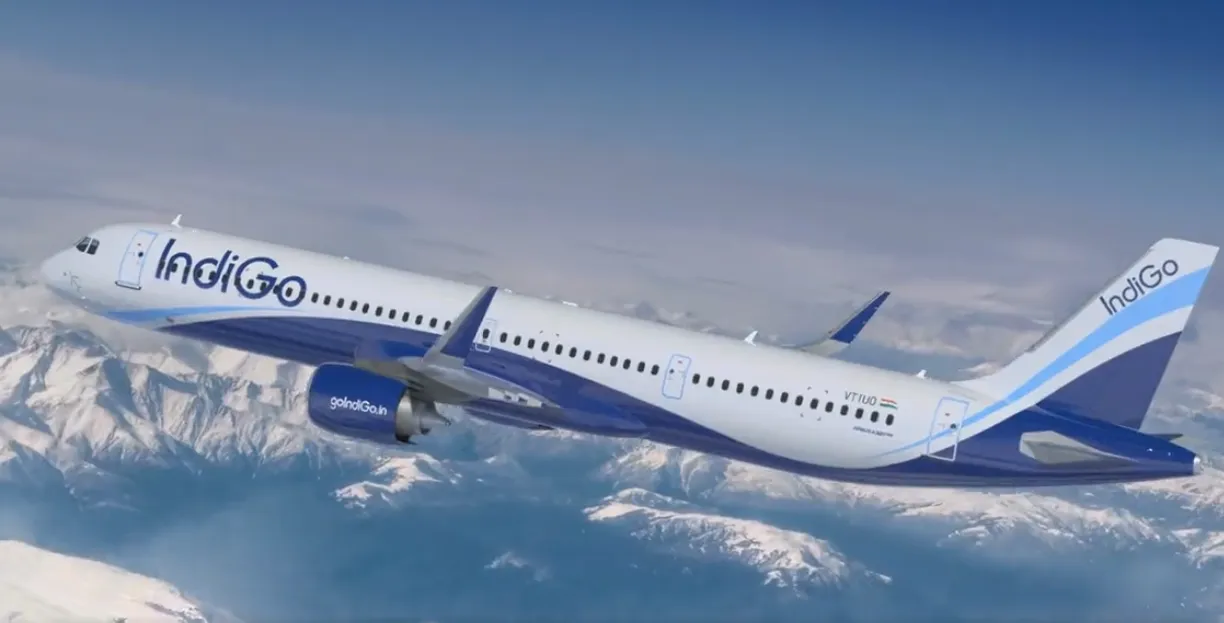Upstox Originals
Why is IndiGo expanding its presence in the Indian hospitality industry?

7 min read | Updated on May 20, 2025, 19:52 IST
SUMMARY
IndiGo’s parent company, InterGlobe Aviation, is charting a new course, fuelled by smart business diversification. Its expansion into the hospitality sector in partnership with Accor can open new avenues for its business.
Stock list

IndiGo is India’s largest airline with 400+ aircraft, connecting 90+ domestic and 40 international destinations. | Image: Shutterstock
India’s biggest airline is not just flying passengers, it has also figured out how to stay with them through every leg of their journey.
Yes, we are talking about IndiGo.
The sky is not the limit for IndiGo as it establishes its presence on the ground by flying straight into the hotel business.
And, it is playing it smart! Let us tell you how!
IndiGo’s parent company, InterGlobe Aviation, is expanding its partnership with French hospitality giant Accor to offer unique travel and hospitality benefits to its customers.
But here’s something that you might not know!
This is not the first time these two conglomerates have come together. InterGlobe and Accor have been partners since 2004. Since then, they have been developing hotels across various Indian markets.
They currently run the Ibis and Novotel chain of hotels in India under InterGlobe Hotels, which was set up as a 60:40 joint venture (JV) between InterGlobe Enterprises and Accor Asia Pacific in 2004.
So, what’s the new buzz in this 20-year-old partnership? Let’s find out!
Strategic alliance between InterGlobe and Accor
InterGlobe and Accor are now expanding their 20-year partnership to form an integrated hospitality platform in India in collaboration with Treebo Hospitality Ventures. This strategic collaboration between InterGlobe and Accor is structured around two key initiatives:
- Investment in Treebo
Treebo is one of India’s leading branded budget hotel chains. It operates over 1,000 hotels in 122 cities across India through its unique tech-driven approach and efficient distribution systems.
InterGlobe and Accor have jointly invested and become major stakeholders in Treebo. With this collaboration, Accor will benefit from Treebo’s state-of-the-art technology stack across hospitality operations and expand its footprint across all segments from economy to luxury. In fact, Accor can use Treebo’s operational excellence and strong distribution to get access to India's vast unbranded hotel market. This can be a real growth driver for Accor.
Under this JV, Treebo will develop and expand Accor’s Ibis and Mercure brands across India in the mid-scale segment.
- InterGlobe and Accor tie-up
The InterGlobe-Accor partnership seeks to create India’s fastest-growing hospitality enterprise. And to that end, both companies plan to bring together their expertise, hotel operations and currently owned assets in India under one new, unified hospitality platform. The new hotel management platform will be in charge of expanding all Accor brands in the country, including its luxury and lifestyle hotels.
Accor currently operates 71 hotels in India with 40 more in development, spanning from economy to luxury brands. Through the new JV, InterGlobe and Accor plan to operate an additional 300 hotels in India under the Accor brands with a combined capacity of 30,000 hotel rooms by 2030. If this target is achieved, it could position them among the top three hospitality players in the country.
These new hotels will operate in India’s fast-growing mid-market segment, which is expected to see major growth in Tier 2, 3, and 4 cities.
For context, India’s branded hotel industry has over 1,80,000 rooms. Of these, roughly 39%, i.e., about 78,000 rooms, belong to the upscale to luxury segment, including resorts. The remaining 61%, i.e. about 1,02,000 rooms, belong to mid-scale and budget segments. This is the chunk where Treebo operates and where IndiGo might look to build synergy with its customer base.
What’s interesting is that IndiGo is also strengthening customer loyalty beyond hotels.
IndiGo and Accor have merged their loyalty programs. Members of either program will be able to earn and redeem points across flights, hotel stays, and experiences from the broader hospitality ecosystem.
For example, members flying with IndiGo will earn points that can be used at Accor hotels, and Accor members can use their points while booking flights with IndiGo. This is offering value to customers beyond just flights—an impressive strategy!
But the key question is:
Why is InterGlobe diversifying its hotel business?
You see, India’s hospitality market is booming. As per ICRA, it is projected to grow by 7-9% YoY in FY25 and 6-8% YoY in FY26. And InterGlobe wants to scale new heights in this booming market.
Now here’s something interesting.
While the market is expected to grow and there is a huge demand forecast, the current supply pipeline is extremely low. If you look at the past two financial years' data, the demand grew by 8-10%, but the room inventory increased by only 5%. Demand is expected to outpace supply for the next 2-3 years. This will give ample room to InterGlobe and Accor to step in and fill the gap.
Secondly, India is on track to become the third-largest domestic travel market by 2027. India’s evolving travel landscape will also boost the hospitality sector, with higher demand for branded accommodation, food, and related services. So clearly, there is growth potential in this business.
Thirdly, the hotel industry in India is highly fragmented. This presents a huge opportunity for organised branded players to tap into this market. By leveraging InterGlobe’s deep market knowledge, Accor’s global hospitality expertise, and Treebo’s innovative tech-driven hospitality operations expertise, the partnership can prove to be a turning point in India’s hospitality landscape.
Lastly, by expanding into the hotel business, IndiGo can create a value chain around its core airline business. Let us explain to you how!
See, IndiGo has business know-how and deep market insights. For context, IndiGo is India’s largest airline with 400+ aircraft, connecting 90+ domestic and 40 international destinations. It operates more than 2,200 daily flights. And, in FY25, the airline served 118 million passengers.
IndiGo can leverage its airline customer data to offer its passengers an end-to-end travel experience. It can help IndiGo offer personalised hotel recommendations, create targeted hotel promotions and discounts and improve customer experience by offering them an integrated platform that provides hotel bookings alongside flight bookings. It will not only improve customer loyalty but also increase IndiGo's revenue.
So yes, these smart business strategies can pay off for InterGlobe Aviation.
But it’s also easier said than done!
Building a hotel empire is very different from running an airline. Given the fragmented and competitive hospitality sector, Interglobe's real test will be whether it can scale operations and deliver a consistent customer experience.
But for now, the picture seems positive for the airline.
InterGlobe’s business moves are paying off
IndiGo’s business diversification from a no-frills carrier into a full-fledged travel brand offering hospitality and lifestyle experiences marks a strategic step forward for the airline and opens new revenue streams for the brand.
Recently, IndiGo has overtaken US-based Delta Air Lines to become the world’s most valuable airline with a market cap surpassing ₹2 lakh crore. It is the only Indian carrier to secure a spot in the global top 10 airlines based on market capitalisation.
The market is also taking note of these developments. We can clearly see the optimism reflected in IndiGo’s share price.
Currently, IndiGo trades at a price-to-earnings (P/E) ratio of 35.1; that’s around 63% above its 10-year median P/E of 21.6. This premium reflects the market's confidence in IndiGo. IndiGo’s stock is currently valued at only 2–3% away from its lifetime peak. So as IndiGo Airlines climbs to new heights, let’s fasten our seatbelts—this ride could be exciting to watch.
By signing up you agree to Upstox’s Terms & Conditions
About The Author
Next Story
